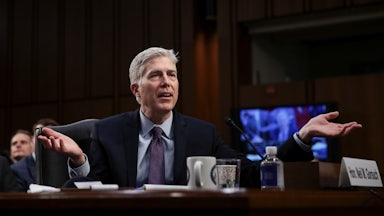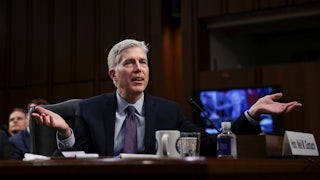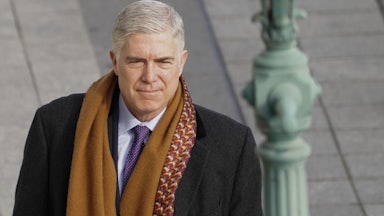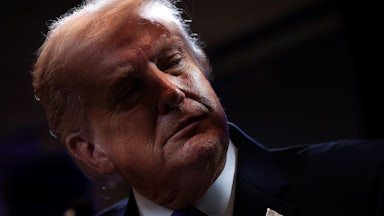The Supreme Court often decides cases that affect everyday life for Americans. But few of its recent decisions have matched the real-world impact of McGirt v. Oklahoma, which recognized the continued existence of tribal reservations to the eastern half of the state after a century of abeyance; it was one of the most significant legal victories for Native Americans in recent memory. Now the high court has another such matter to ponder: In its latest case on tribal sovereignty, the court may be poised to change who can prosecute crimes in Indian country through the entire United States.
Oklahoma v. Castro-Huerta is a sequel of sorts to the court’s landmark ruling in McGirt v. Oklahoma two years ago, as well as a wholly new dispute over the relationship between state and tribal sovereignty. In McGirt, the Supreme Court ruled that Congress had never actually disestablished the reservations of Native American tribes in eastern Oklahoma in the years leading up to Oklahoma’s statehood. As a result, roughly half the state officially became Indian country once again. The 5–4 decision brought Justice Neil Gorsuch together with the court’s four liberals at the time.
Recognizing eastern Oklahoma as Indian country affected a wide range of legal questions. In McGirt, the question at hand was criminal jurisdiction. Jimcy McGirt, that case’s namesake, had been convicted by an Oklahoma state jury of committing serious sexual crimes. Both he and his victim were tribal members. Under federal law, certain major crimes committed by one tribal member against another tribal member in Indian country must be prosecuted by the federal government, not the states. McGirt received a new life sentence from a federal judge last year after the Justice Department took over his case.
Victor Castro-Huerta, the current case’s namesake, also found his own criminal case affected by the McGirt ruling. An Oklahoma state jury convicted him of child neglect for his maltreatment of his 5-year-old stepdaugher, who is legally blind and has cerebral palsy. The Supreme Court decided McGirt while Castro-Huerta was appealing his case on other grounds. After learning that his stepdaughter was an enrolled member of the Eastern Band of Cherokee Indians and that the neglect had occurred in Indian country, the Oklahoma Court of Criminal Appeals vacated his conviction. Oklahoma unsuccessfully argued that it had concurrent jurisdiction to prosecute him, an argument it had explicitly disclaimed in the McGirt litigation, in addition to the federal jurisdiction. Castro-Huerta soon thereafter pleaded guilty as part of an agreement with federal prosecutors for the same offense and received a seven-year prison sentence.
Top Oklahoma officials, including Governor Kevin Stitt, have argued that McGirt has upended the state’s criminal justice system by throwing numerous state-court convictions and sentences into doubt. The state first asked Congress to intervene in its favor without success, then urged the Supreme Court to overturn McGirt. It would be virtually unprecedented for the Supreme Court to overturn one of its own decisions so soon after it was decided. Oklahoma officials have pointed to data that they believe would justify the court’s about-face: In their petition for review in Castro-Huerta, for example, the state claimed that the 2020 ruling meant that state prosecutors had lost jurisdiction over more than 18,000 prosecutions each year.
Those numbers, however, have come under scrutiny. Journalists Rebecca Nagle and Allison Herrera, writing earlier this month in The Atlantic, found a “gap” of only 1,000 prosecutions since McGirt, which they said could be attributed to the pandemic’s general impact on arrests and prosecutions. In most other instances, federal and tribal prosecutors have brought new charges in their respective courts as those offenses shifted to their jurisdictions. Nagle and Herrera found only 33 instances where a state prisoner was released without further charges because of McGirt, a far lower number than state officials had hinted at in their public comments.
When it urged the justices to take up the Castro-Huerta case, Oklahoma also asked the Supreme Court to consider overturning McGirt. The justices declined to take up that question and instead stuck to the jurisdictional question. While McGirt focused on crimes in Indian country where both the offender and victim were tribal members, Castro-Huerta is about crimes in Indian country where the offender was non-Indian and the victim was a tribal member. (States have jurisdiction when both sides are non-Indian, even on tribal land.)
For the tribes and the Justice Department, the answer to this question is pretty straightforward: Jurisdiction falls to the federal government under the federal General Crimes Act, which explicitly extends the prosecution of “general” federal crimes to Indian country. That law reflects a principle dating back to the Supreme Court’s 1832 ruling in Worcester v. Georgia, which stripped states of their jurisdiction over crimes involving tribal members in Indian country.
In everyday practice, criminal jurisdiction in Indian country is often the result of complex compromises struck between Congress, the states, and tribal governments over the past two centuries. In some states, the tribes allow state prosecutors to try cases on their lands rather than do it themselves. In others, the tribal governments exercise that power for most offenses and leave major crimes to the feds. “[Oklahoma] invites this Court to undo those choices, upend Congress’s scheme, and jettison an understanding settled for 75 years or more—all to create by judicial fiat sweeping criminal liability without precedent since the Founding,” Castro-Huerta told the justices in his brief for the court.
/ In honor of Earth Day, TNR’s climate coverage is free to registered users until April 29. Start reading now.
Oklahoma, for its part, cited two Supreme Court cases from 1882 and 1896 that suggested that the states could exercise criminal jurisdiction and argued that the federal government had not explicitly preempted it. “While the holdings in those cases were limited to crimes committed against non-Indians, their reasoning sweeps more broadly and supports the exercise of jurisdiction when the defendant is a non-Indian and the victim is an Indian,” the state claimed.
The hiccup here is that the General Crimes Act appears to preempt state prosecution, stating that “the general laws of the United States as to the punishment of offenses committed in any place within the sole and exclusive jurisdiction of the United States, except the District of Columbia, shall extend to the Indian country.” Oklahoma argued that when Congress said “sole and exclusive jurisdiction,” it actually “identifies only the body of criminal law borrowed and applied to Indian country; it does not describe federal jurisdiction in Indian country itself.”
In Wednesday’s oral arguments, the justices who were members of the McGirt majority appeared unconvinced by Oklahoma’s claims, pointing to later rulings and long-established practice that belied the stance attributed to the two late-nineteenth-century cases. “This Court has indicated six times that you are wrong,” Justice Elena Kagan told Kannon Shanmugam, who argued on behalf of Oklahoma. “Congress has indicated that you are wrong given its consistent enactment of statutes that make no sense in light of your position, Public Law 280 and the state-specific ones. The executive branch has said that you are wrong in all but one decade. You know, you’re asking us to do a big lift on the basis of language that, as I say, seems to me more naturally read against you.”
Gorsuch, the author of McGirt, noted that state governments historically had a track record of “abusing Indian victims in their courts,” which shaped how the federal government structured the jurisdictional relationships. “George Washington wrote letters about this at the outset of the nation’s history,” he recounted. “In the 1920s, Oklahoma systematically used its state courts to deprive Indians of their property when oil was discovered on their lands. There’s a long history of this.” Gorsuch also noted that the treaties signed between the U.S. and the Oklahoma tribes had effectively promised them that they wouldn’t be placed under state jurisdiction because of the tragic history there.
The justices who dissented from McGirt, by comparison, appeared more sympathetic to Oklahoma’s stance. Justice Samuel Alito questioned Erwin Kneedler, who argued on behalf of the Justice Department in the tribes’ favor, on why state and federal jurisdiction wouldn’t be more beneficial for crime victims than exclusive state jurisdiction. Justices Clarence Thomas and Brett Kavanaugh also appeared to favor its interpretation of the laws and precedents.
Predicting outcomes from oral arguments is always tricky, and the remaining two justices did not help matters. Justice Amy Coney Barrett, the only member who didn’t take part in McGirt, did not clearly tip her hand in her questions for the parties. Chief Justice John Roberts, who wrote a rare dissent in McGirt, implicitly chastised Oklahoma for invoking McGirt’s consequences so often in its arguments. “Really, at the end of the day, when you’re talking about McGirt, you’re really just waving a bloody shirt,” he told Shanmugam. “It doesn’t have any direct pertinence on the legal analysis here.” At the same time, some of his questions to Castro-Huerta’s lawyer appeared to suggest he might favor Oklahoma’s reading of the General Crimes Act.
In McGirt, the ruling’s impact was limited to Oklahoma and its unique relationship to Native American tribes. A victory for Oklahoma in Castro-Huerta, however, could have broader implications. By expanding state prosecutions on tribal lands, the court could upset the balances struck between Congress, the tribes, and the states for more than a century. In McGirt, it was the state of Oklahoma that wanted to maintain a long-standing status quo. In Castro-Huerta, it’s the tribes’ turn. When it comes to the court’s recent rulings on tribal sovereignty, the only constant thread might be change. A ruling is expected by the end of June.










